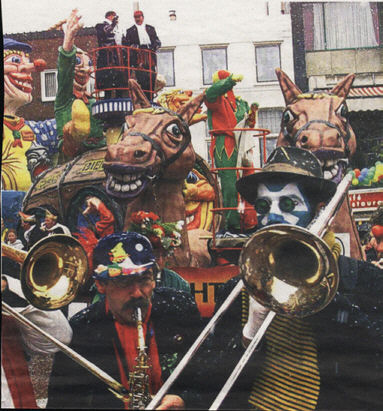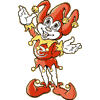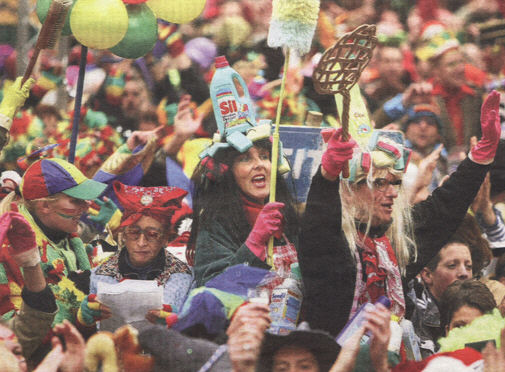

Neither king nor emperor can abolish it!
Carnival in Holland!
Carnival starts in Maastricht with the running up the flagpole of 'het
mooswief' (Maastricht dialect for: the greengrocerwoman) and the firing of
'the cannon' on 'the Vrijthof', the well-known square in the middle of the
town. That is followed by the grand procession, followed in turn by three
days and nights of celebration! In the streets, in the pubs and everywhere.
Every year there is a new 'Prince Carnival' with his 'Council of Eleven',
every year there is again a crazy new carnival song, that you can hear being sung and played everywhere, and naturally, you sing and dance with complete strangers, all together, in some costume or other, in the streets, in the
inns which have been completely cleared for the occasion, except for the
beer taps. Out of one hostelry, into the next.
Music resounds through the streets, it rains kisses in the many cosy, warm
pubs around 'the Vrijthof' and other proper area's of Maastricht, you dance,
you sing, you do what you like, you flutter like a butterfly. You are gypsy
or princess, potbelly stove or lampshade, and you are...yourself. You
discover the reason in the nonsense.
What fun, but also: what tricks we played on each other.
There was, for example, the time, when my father (who only wanted to have
a look around) just put on a funny nose, or else he would have been
noticed. Secretly, we had put in a piece of Limburger cheese. Limburger
cheese, known as 'Rommedoe', is delicious, like French cheese, but stinks terribly. Like sweaty feet.
Later my father told us, at the peasoup when he found a few of us there
in the kitchen, at that moment, that the entire evening, wherever he
went, had wondered "who smelt so much"...
A bit of folklore, which annually makes its presence felt.
There are no better words to describe the carnival than an exuberant
people's feast that has since who knows when has been celebrated in many
places, but the one in Maastricht is shown on TV. But what is it that
supports this feast so that it returns every year again?
Although opinion is divided, it is certain that, in the first place, the
carnival is a turn-around-rite. This element throughout the centuries always plays a meaningful part: the turned around world pointed to the kingdom of
the dead where everything happened in reverse. It concerns, in other words,
a celebration of society inside out and upside down. An escape mechanism in
the community in which individuals are robbed of their freedom for the sake
of the social hierarchy.
The fact is, that the origin of carnival is uncertain. Very many
carnivalologists claim that carnival has nothing to do with christianity.
They are in fact convinced that it was not just a coincidence that
continually similar celebrations with a lot of similar characteristics
evolved thoughout the centuries and returned. One of those important
characteristics was certainly the idea of fertility and the birth of
humanity and nature. Accordingly the winter was farewelled with much
happiness and triumph and spring welcomed - as in the burning and drowning
of a straw effigy - in Breda they threw the Shrove Tuesday doll into the
Mark (river) and in Roermond into the Roer (river).
Other carnival experts confirm, however that there is a link between
carnival and christianity. They assert that the event did not exist
before the year 1000 and that it is obviously rooted in christianity. The exhuberance of carnival functioned then as antidote to the abstinance
during fasting.
Yet others see in carnival as medieval creation a common people's
interpretation of the miracle play.
And then of course there is the word itself 'carnaval' (Dutch). Although
there seem to be other explanations possible, the derivation from the churchlatin 'carne levare', which points to the spoiling of meat, is a possibility.
It is from this 'carne levare' that later 'carnevale' evolved.
One of the many peculiarities which add colour to carnival, is the
well-known carnival greeting: 'alaaf'. Not with the right hand to the right
side of the forehead, as is customary, but with the top of the right hand
to the left temple. Possibly a then-parody of the strong militarism of the Prussians - a so-called alternative greeting, or a pointer to the number 11.
The fools number par excellence, which regulary appears in the carnivalesque events:
-the Council of Eleven;
-on the 11th of the 11th month the carnival season is commenced with celebrations, the Council of Eleven is meeting first time;
-eleven is an evil number, it exceeds the ten commandments.
And then there are the masks and the disguises. The present meaning of
those must be found in the temporary escape of normal life. This one causes
to happen by climbing into another skin. One sometimes calls clothing
people's social outer skin. Well now, this outer skin one changes for a
certain period. From a disguised carnivalist one can expect anything.
Their actions are no longer predictable, but noone is concerned about it.
Carnival is a living people's entertainment, that, in spite of the
obstacles of the past and now, still exists.
Was Petrus Canisius right when in 1572 he wrote:
"Carnival, in my opinion, cannot be abolished by king or emperor"?
We have done it again, as ever, in the southern parts of our country!
Carnival is in fact a Burgundian feast, which northerners do not know
how to handle. Northerners try to 'organize' carnival, while you cannot 'organize' a fever. You 'get' it and you go to meet others who 'got' it.
What has to be organized, is organized by those who know they will 'get'
it themselves. That is something totally different than to organize costumed feasts.
Oh, how often we have been there, in Maastricht, where my parents came
from.

We stayed with family, but were never home. Only when we grew hungry.
Then for three days and nights long there was an enormous pot of peasoup bubbling away on the stove, and anyone in the family who felt hungry came
back to fetch himself a cup, to then dive into the celebrations again. For sleeping we had no time, so we didn't do that.
Totally broke we came back
at school and work then at wednesday.




